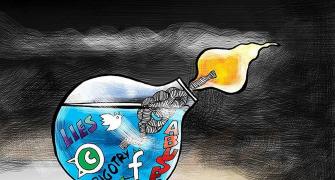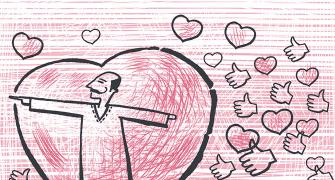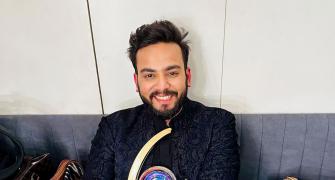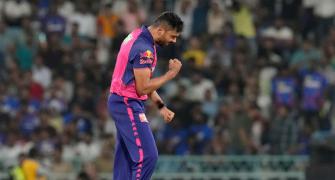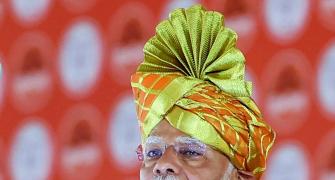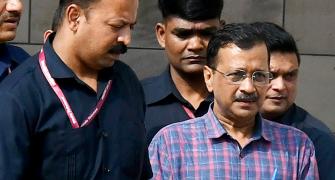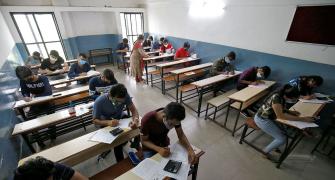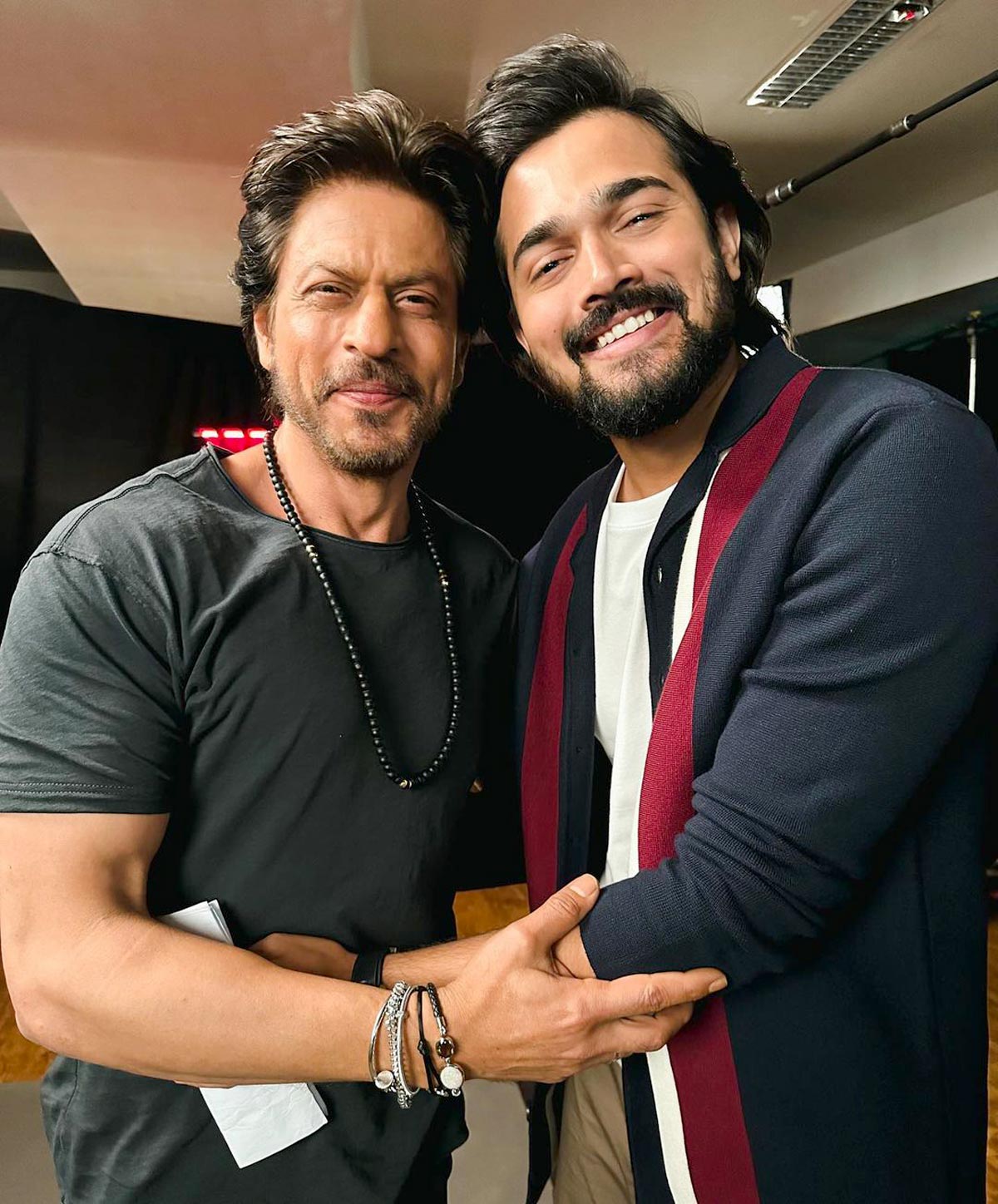'While other parties generally need support directly from their central leadership to get influencers or celebrities to endorse their party, the work of identifying and contacting such influencers has been decentralised to state and district level IT cells to get more engagement in the BJP.'

As everyone knows, Prime Minister Narendra Damodardas Modi has not addressed a single press conference in the 10 years he has been at the helm of government.
His supporters don't see this as a problem because in the age of social media Modi beats all his political opponents hands down when it comes to communicating on social media.
Name a social media site and you find Modi's followers far outstripping every one of his political rivals.
And ever since 'Influencers' arrived on social media, Modi has captured the minds of Indians through them.
How have these influencers helped Modi and his Bharatiya Janata Party gain more popularity?
A study (external link) conducted by Joyojeet Pal, associate professor at the University of Michigan, Ann Arbor, found answers to this question by tracking down the works of five YouTube influencers.
Joyojeet Pal spoke to Syed Firdaus Ashraf/Rediff.com in an e-mail interview about his research for which two of his students, Sarah Khan and Rudransh Mukherjee, joined him.
What made you research the subject Influencer collaboration YouTube: Changing Political Outreach In The 2024 Indian Elections?
We have been studying social media and politics in India since 2013, and since that time we have consistently followed various trends related to political social media in India. Consequently, studying this was a natural continuation and extension of our past work.
What were your learnings from your study?
The main learning from our study was that getting interviewed by influencers instead of by journalists is beneficial for politicians for three reasons.
First, they allow a politician to be seen in a different light -- so perhaps their food habits, their travel habits, their home. These humanise a politician in the eyes of the electorate and benefit them in different ways than a typical electoral speech does.
Second, influencers help to reach a different audience than say media houses, which are already quite polarised.
In a nutshell, if a politician does an interview with news house which is already pro-BJP or pro-Opposition, then the audience is already going to vote in one direction or the other, but if when a politician goes to a technology influencer or a travel influencer, they get access to a new audience which may be politically undecided, and consequently more likely to be 'converted' by their conversation on the platform.
Third, we find that such engagements allow politicians to present the spectre of being interactive and interested in engaging citizens' questions, whereas in fact most of the questions are easy questions that do not challenge a politician in the same way that a professional journalist who is better aware of policy issues may.
Did your study discover how these five influencers have improved Mr Modi's brand image?
These five influencers have not directly impacted the brand image of Prime Modi. However, whenever BJP ministers appear on shows by influencers, they tend to mention Modi multiple times through an interview, and in some cases have his picture in the background, so this strengthens his image for viewers of those shows.
How many YouTube users are in India and what is their time engagement in a day? What kind of content do they consume?
Per the most recent data, there are in excess of 630 million YouTube users in India.
Did these influencers ask any hard-hitting questions to BJP ministers on their show?
No, the influencers generally asked lightweight questions that did not corner or aggressively engage the interviewees on political matters. Vivek Bindra is the only influencer who asked relatively well-informed policy-specific questions, but his tone was friendly, and he did not challenge the interviewees or push with follow-up questions when an interviewee declined to directly address an issue.
What was their style of interviewing Opposition leaders, those who do not support Mr Modi?
Most of the influencers only interviewed BJP politicians; however, Curly Tales did interview Rahul Gandhi and Aaditya Thackeray, while Beer Biceps interviewed Aatishi and Raghav Chaddha, who are from the Aam Aadmi Party.
While Curly Tales' interviews generally eschew politics, we found that with Beer Biceps, the interviews were less deferential with the AAP politicians than with the BJP politicians.
Did the influencers ever highlight issues like unemployment, inflation, lynching or disturbances in the communal fabric of India post 2014?
In general, the influencers avoided all controversial topics which could have been embarrassing to the politician during an interview.
In 2016, you did a study on how Twitter helped build Brand Modi; one wonders why Opposition parties fail to use the Internet to their advantage?
That paper showed that brand management strategies around the ways that Narendra Modi was portrayed online helped change his image from a strongman to a development-oriented leader, and one who was palatable to voters who may not have traditionally been BJP voters.
This branding campaign, and the use of social media and technology, helped emphasise that Modi was not just a provincial leader, but rather a statesman with a global vision, befitting the head of government in India.
Opposition parties lacked the foresight early during the social media years in India, and as a result the BJP was able to secure an early lead in terms of following and engagement online.
While Opposition parties tried to match the BJP in terms of some of the tactics of network outreach and online attacks, the early leadership of the BJP remained in place and the party has consistently outperformed opposition.
The only party that came close to a social media strategy that significantly challenged the BJP was the AAP in its early days.
In recent years, the level of organisation that the BJP has had at the state and district level has been a significant advantage for the party, especially with getting celebrity or influencer endorsements.
While other parties generally need support directly from their central leadership to get influencers or celebrities to endorse their party, the work of identifying and contacting such influencers has been decentralised to state and district level IT cells to get more engagement in the BJP.
This strategy works with local level influencers, whereas at the national level, the high value influencers already have established relationships either directly, or through various agencies, to the BJP leadership.
It is also easier for them to engage or endorse the BJP, since that endorsement can be presented as a push for the government or a specific ministry, rather than as an endorsement for the politician. These factors give the BJP an upper hand with influencer-based engagement.

